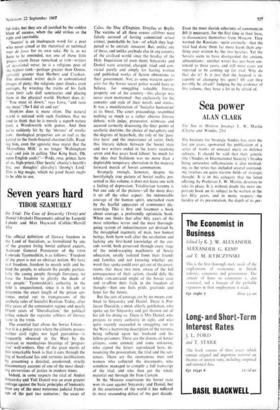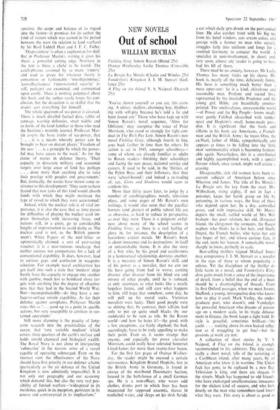Sea power
ALAN CLARK
The Institute for Strategic Studies has, over the last ten years, sponsored the publication of a series of works of unusual merit on defence subjects. It should be said that their generic title (Studies in International Security') besides being somewhat selfconscious is also mislead- ing, as the series has included several outstand- ing treatises on quite narrow fields of strategic thought. It is in this category that the latest offering, by Professor L. W. Martin. deserves to take its place. It is without doubt the most im- portant book on its subject to be written in the last fifty years, and in many respects—the lucidity of its presentation. the depth of its per-
spective, the scope and balance of its regard into the future—it promises for its author the kind of stature which was earned in the period between the wars (in relation to land warfare) by Sir Basil Liddell Hart and J. F. C. Fuller.
'Dispassionate' is often a euphemism for dull. But in Professor Martin's writing it gives his thesis a powerful cutting edge. Nowhere in the text is there a cliché to be found. The catch-phrases assumed by so many 'experts' and used as props for whatever theory is convenient or fashionable—interdependence,' `cost-effectiveness' (international security' it- self, perhaps) are examined, and commented upon coolly. There is nothing polemical about this book and the author rarely forces his con- clusion, but the dissection is so skilful that the reader sees everything for himself.
The whole spectrum of sea-power is covered. There is much detailed factual data, tables of tonnage, warship deliveries, strait widths and so forth, of the kind familiar to those who read the Institute's monthly journal. Professor Mar- tin asserts the basic truths of sea-power, that `. . . it is a means whereby power can be brought to bear on distant places.' Freedom of the seas `... is a principle by which the power- ful may have access to the weak.' As for the status of navies in defence theory, 'Their capacity to devastate military and economic targets over large areas of land has perhaps . . . done more than anything else to raise their prestige with peoples and governments.' But, ironically, the navies have shown some re- sistance to this development: 'They seem to have feared that new tasks of this kind would absorb funds with which they might maintain the type of vessel to which they were accustomed.'
Indeed, while the nuclear role is of vital im- portance, it is also the case that as time passes the difficulties of playing the nuclear card im- press themselves with increasing force, and nations will, in a crisis, go to considerable lengths of improvisation to avoid doing so. The nuclear card is not, as the British govern- ment's White Papers of the mid-'fifties so optimistically claimed, a sort of cost-saving voucher, it is a near-ruinous surcharge that neither excuses nor compensates for a lack of conventional capability. It does, however, lead to curious gaps and confusion in weapons- selection. For example naval architecture has got itself into such a state that 'modern' ships barely have the capacity to engage one another with gunfire, much less to bombard shore tar- gets with anything like the degree of effective- ness that they had in the Second World War. Nor—incomprehensibly--do they have a sur- face-to-surface missile capability. As for their defence against aeroplanes, Professor Martin rates this as `. . good up to a point in specific actions, but very susceptible to attrition in sus- tained operations.'
Still more alarming is the paucity of long- term research into the potentialities of, the ocean, that 'very variable medium' which covers three quarters of the earth's surface and holds untold chemical and biological wealth. The Royal Navy is not alone in interpreting `submarine' in the narrow sense of a vessel capable of operating submerged. Even on the shortest view the effectiveness of the Navy should have first priority in our defence scheme (particularly as the air defence of the United Kingdom is now admittedly impossible). It is not only our geography and our economy which demand this, but also the very real pos- sibility of limited warfare—`widespread in its incidence, quick in its inception, persistent in its course and controversial in its implications'



































 Previous page
Previous page